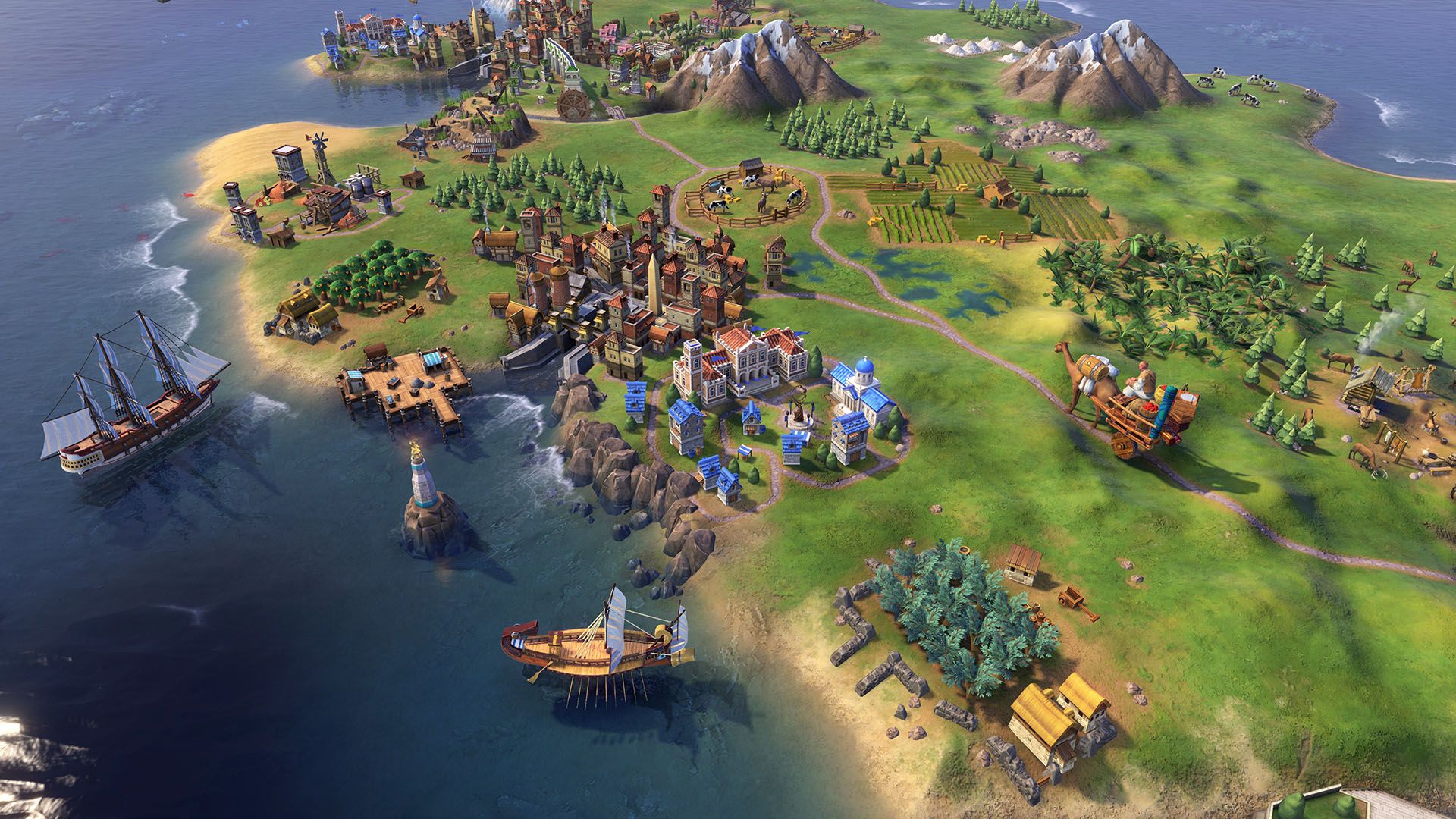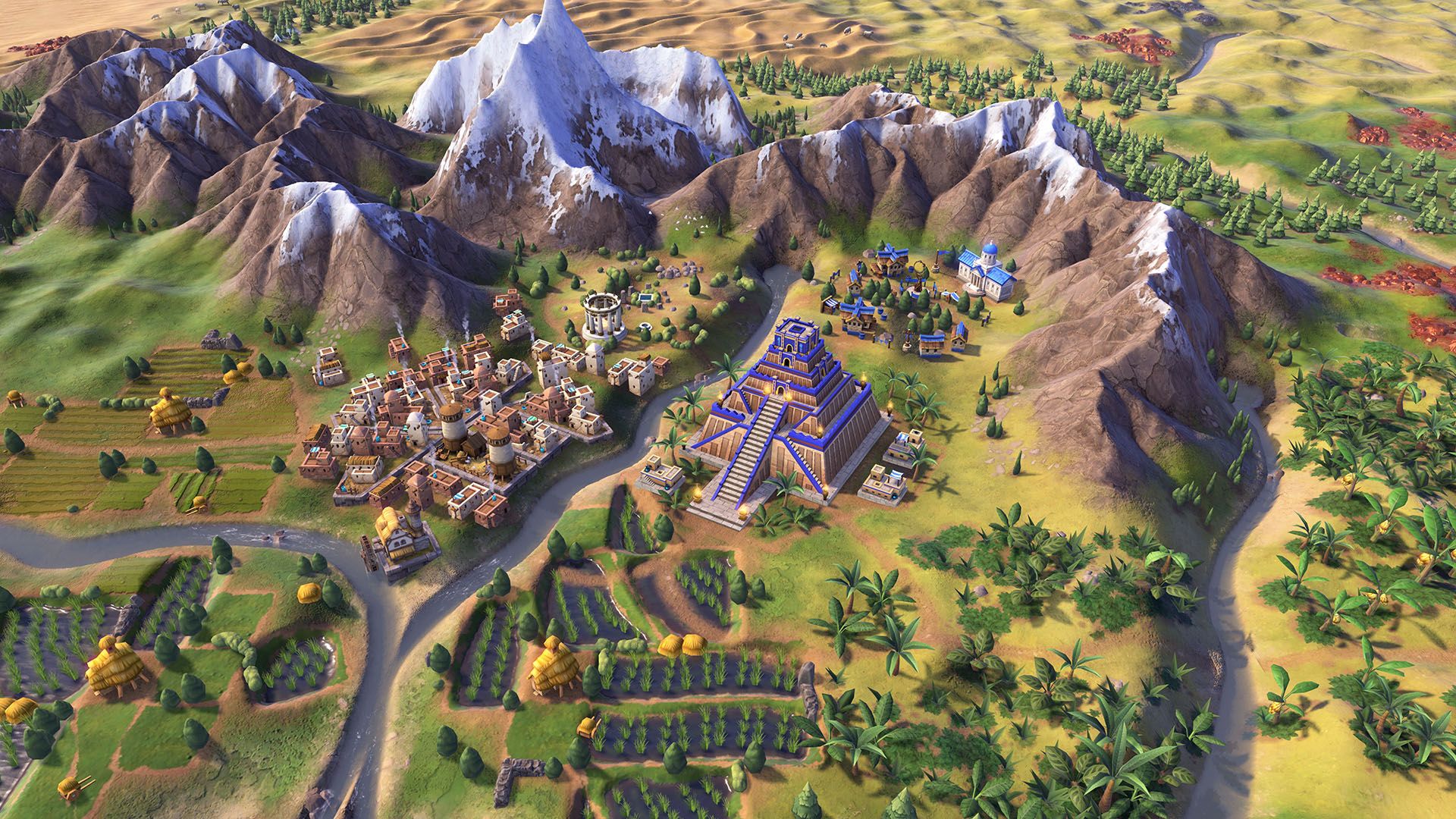Here’s how it works: Portugal has the Nau, a unique naval melee unit that replaces the Caravel. It starts with one free promotion, requires less maintenance than the Caravel and has two charges to build Feitorias - special shipping ports unique to Portugal. A Feitoria can only be built by a Nau unit on a foreign city’s coastal tile next to a luxury or bonus resource. This hugely exciting new mechanic has certainly set the cat among the pigeons within the Civilization community. Will players be able to abuse it in multiplayer? Will AI Portugal be aggressive in coming over and plonking down the Feitoria on a single-player’s coastal tile? How do players mitigate against it? Will they even want to? I sat down for a Zoom chat with Firaxis lead designer Anton Strenger and associate producer Kevin Schultz to talk about Portugal and its new mechanics, how the Barbarians revamp that came out earlier in the pass is working out, and what’s next for Civilization 6? While a “beefy” update focusing on balance is due out in April, will Firaxis release a new pass with new civs afterwards? Or will it then move onto the inevitable Civilization 7? Read on to find out more. You’re letting people put buildings on other civ’s tiles, including in multiplayer. I don’t think you’ve done this before. What was the inspiration? Is there a concern it will be abused? Strenger: City states for Portugal are the easy targets because João starts with open borders with all city states. So being able to go into their territory and find the right place next to a resource on the coast and pop a Feitoria with your unique unit, that’s going to be the easy ones you can find. The more difficult ones are going to be other civilisations. But there’s a couple mitigating design factors we have so it doesn’t become a really big annoyance. First off, you have to have open borders with the player. So if you’re playing against Portugal, you’ll know hopefully, okay, if I give them open borders, maybe they’ll come and build a Feitoria. But even if they do, it’s actually a win-win relationship, because the Feitoria has an advantage for Portugal, obviously, but it also has an advantage for the host city. Portugal gets better trade routes going to that coastal city, which is nice, because it synergizes with their bonus of international trade routes going over the water and getting more income that way. But the host city, if they work that tile, actually gets some gold and a little bit of culture. The Feitoria is off the coast in the water, so it’s not taking up a valuable place they might want to put a land district or something like that. So there is a chance they put the Feitoria exactly where I was going to put my harbour or one of my aquatic wonders, but it’s relatively rare. And we’ve playtested this quite a bit. It could be that we’re wrong, and we’ll see that once it gets in the hands of the community. But it’s just such a cool, different concept - and that’s been the recurring theme for a lot of the civilisations in the New Frontier pass, to take the way you play the game, and when you’re playing this civ or when you’re playing this mode just totally flip it on its head. Just to clarify, if another player or the AI builds a Feitoria in my space, there’s nothing I can do to remove it? Strenger: Yes. It is there. But you can work it and get yields from doing that. We didn’t allow you to pillage it, because then that would suck for Portugal, right? Because it takes a lot of investment for them to build the Nau, to send it and find a right place, and then to build a Feitoria. If the host city could just counter that by being like, no, I’m gonna waste all your resources and just pillage it, that would not be fun for Portugal. It was definitely a balancing act. Do you see the AI being aggressive and trying to do this to other players when you’re playing single-player? Strenger: It could be, yeah. We’ve done a lot of work on the naval AI recently. So I think that could happen. Yeah, it’s possible. But again, the open borders is the main tool that players have if they don’t want to even invite the possibility, to just keep Portugal out. And then the AI will be perfectly happy to just go to a city state instead. It feels to me like the Frontier Pass has worked out well for Civilization 6. The way I’ve played it, I’ve dipped in when something’s caught my eye and then by the time I’ve had my fill, another thing is coming out that I’m interested in. This is in contrast to the years-long strategy Firaxis had with big expansions every now and again. Do you consider this new system to be a success internally? Schultz: Yeah, absolutely. We’re definitely looking at it as a success. The way you’re experiencing it is music to my ears! We’ve seen a lot of people reacting to it that way. Our player engagement, the impact on numbers of players month-by-month, have shown that people are staying with it over this whole calendar of releases. It’s a success in that we had a sales number we wanted to hit - we hit it… awesome! It’s been a great way for us to bring in our community into the development process. Their feedback has always been incredibly valuable to us. But there’s been in the past, a span of time that was a little bit larger than we would have liked before we could implement that feedback. With these monthly releases, they can play the game, experience it, and discuss it while we’re still making parts of the pass. But we still have the opportunity to update whatever they’re talking about. It’s something that I hope we get to make even tighter - that feedback loop moving forward into the future. From the beginning, I’ve always felt like the design of the New Frontier pass, this monthly release of paid DLC and then game updates, has been a win-win for both the studio and our fans. Each update has come with a new civ. How do you decide which ones to do? I know people had been asking for Portugal for a while, so I get that you will have seen that and reacted to that. But generally, how do you go about deciding which ones to do? Strenger: It’s a very meticulous process. The way I often think about it is kind of like trying to rotate a Rubik’s Cube - if we had Portugal here, what does that mean for this and this? In a traditional expansion, where we’re having eight or nine new leaders, like we did for Rise and Fall and Gathering Storm, we go through this lengthy audit where we look at the game, and we have half a dozen different axes - we’re looking at geographic diversity, we’re looking at chronological diversity, like people not just from the ancient era. We’re looking at gender diversity. We want to have female leaders represented as much as possible. We’re looking at fan novelty diversity. With Portugal it was like, oh, yes, finally! Portugal’s in the game! I love Portugal! I loved playing them in Civ 3! But then we had Gran Colombia, and it was like, what? Gran Colombia has never been in a civ before?! And an added wrinkle for the New Frontier pass is instead of releasing leaders in a big batch, like a holistic cast - like, here’s the nine people and how they represent things - we also had to carefully think about, well, we’re not going to announce everybody at the same time. And each pack has to stand on its own. So we went through this careful process. The very first DLC, for example, was Maya and Gran Colombia. We had this central and southern America focus. And that was not just in the civ design, but also in the natural wonders we added. And also in the Apocalypse mode. Even those natural disasters hopefully evokes the image of the Mayan calendar and the apocalypse. So we tried to have these holistic packs, in case fans didn’t have the pass and they were just dipping in, like, oh, I really like Gran Colombia, so I’ll buy this one but not the rest or something like that. I think we’re on 50 civs for Civ 6 or thereabouts. The Portugal pack has been announced as the last for the New Frontier pass. Are you done? Will there be another pass for Civ 6? I know at some point there will be another Civ game - that won’t be a shock to anyone. What happens next? Schultz: We’re not talking about the future of Civ at the moment. We are focused on the Portugal pack. We also have a really great final game update coming out in April. It’s going to be a pretty beefy pack, very full of some things we also can’t talk about at the moment. But some nice surprises in there, like balance changes we’ve been sitting on for a long time. Strenger: We’re really happy with where Civilization 6 is right now, in this moment. We had a very fully-featured base game, not just with civs and leaders, but also with lots of game systems. Almost all the game systems from Civilization 5 expansions made it into the base version of Civilization 6. Then we had all these DLCs right after launch. And two expansions. And now the New Frontier Pass. So, I’m really happy with where it is in terms of features. My mind is shifting towards, okay, let’s focus on balance right now. What I’m getting at is are you going to do another pass. Can you say that at this point? Strenger: We cannot, no. We don’t have any concrete plans for the future right now. The free Barbarian Clans game mode was brilliant. I think it’s fair to say the barbarians are quite annoying in Civilization 6, and it was great to be able to interact with them in new ways. Now the dust has settled on that mode and you’ve seen what players have done with it, how do you feel about Barbarian Clans? Strenger: I’ve been really, really happy with it. Often there’s this distinction that’s come up in fan communities of modes that they always want to have on, or modes they will sometimes experiment with but are not really their favourites or not part of every playthrough. And the initial reaction that I’ve seen, the pulse of the community is Barbarian Clans are very successful, and a lot of people want to play with them on all the time. You’re not alone in your estimation of barbarians before this mode was launched. They could be quite aggressive. And depending on the player and their preferred playstyle, and also the map, right? Maybe a barbarian camp was right next to you. It was highly variable from game to game. By adding the mode there, it really gave players more tools, where they didn’t have to fight. You could even turn the barbarians against your enemy. I think it’s one of the coolest success stories of the New Frontier pass, because that mode is not something we initially planned. We sort of knew, okay, there’s going to be a community update number five - that’s how we refer to it internally because it’s the one before the April one next month - and we actually kicked around the idea of, maybe we’ll do a scenario or something like that. But we had seen more and more in the community and from internal playtesting that there really seemed to be a gap of the barbarians early game. It felt like there was something there. So David McDonough, one of our designers, just took point on that and really iterated and found something really fun. Schultz: I think that’s a big part of why we’ve seen the game modes be such a success. They’re a little more bite-sized than our traditional game systems that we add into the game, and allow us to put a hyper focus on certain elements of the game. And finally, on Portugal. What is the leader agenda? Strenger: Portugal is all about exploration. And so that’s reflected in João’s leader agenda. He likes players that explore the map, like he likes to do. And if you’re just kind of like a backwater, and you’re just staying to yourself and not exploring tiles, that’s the negative side of his agenda where he won’t respect you as much.



